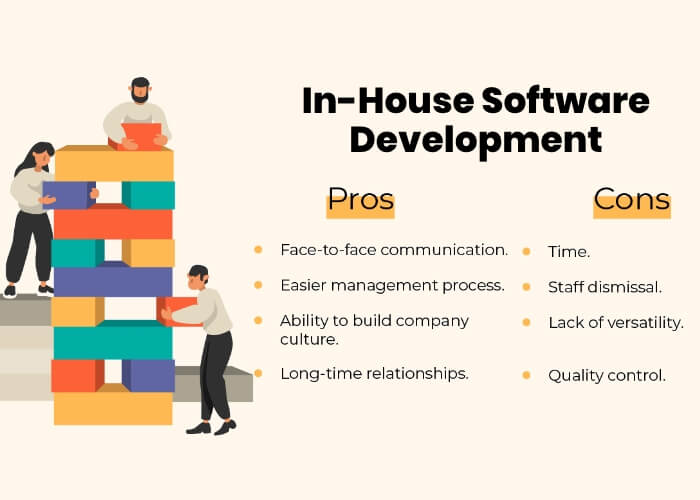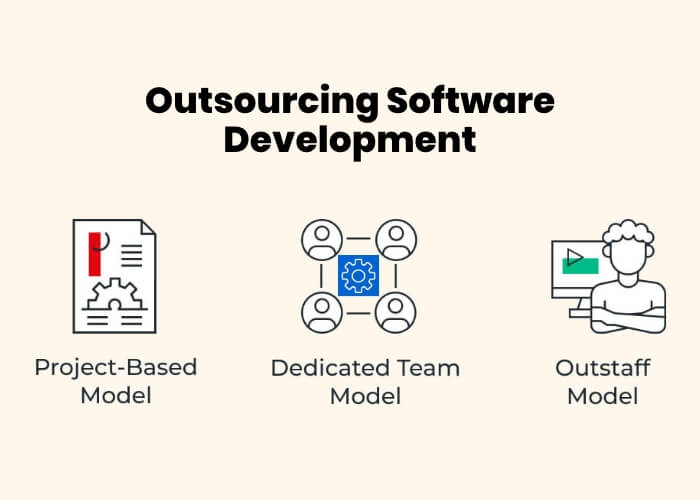
When it comes to application development, outsourcing is a popular option. But in-house development has its fair share of perks as well. This article will clarify everything you require to understand the two and provide tips for choosing between In-House vs. Outsourcing Software Development.
In-house software development–
➣ What is In-house software development, and how does it work?
In-house software development, also known as in-house development or internal IT projects, is a way of doing business that involves building software for businesses. It’s very similar to outsourcing but with some differences. For example, instead of hiring an external company that makes your product for you, you build it yourself by hiring developers and getting them to work at your office. The advantage of internal development is that you have complete control over business logic and IP protection.
Thus, there is no need for third-party involvement in this process since everything falls under one roof.
You get to build long-term partnerships with these talented individuals who will become key members of your team while they help create new products/services based on their expertise, increasing efficiency, among other things.
➣ The advantages of in-house software development include:
While there are many advantages to in-house software development, hiring your developers and having complete control over the recruitment process is the most significant benefit. You can set up team processes and policies that are most effective for your company, giving you confidence in hiring suitable people for the job. You’ll also be able to build long-term partnerships with your team members as they get to know one another better over the period.

- You can set up the most effective team procedures and guidelines for your enterprise.
- You can hire your developers and have complete control over the recruitment process.
- You will have complete control over business logic and IP protection.
- You can set up team processes and policies that are most effective for your company based on the skills and expertise of each development team member.
- You can make a lasting association with your team members as you get to know them well.
- When working with an in-house team member who has been hired by yourself or another company before, there is an element of trust involved which makes communication easier between both parties involved in each project as well as overall team-building efforts within an organization’s hierarchy structure like this one might require if done correctly!
➣ The downsides of in-house software development include:
- You must pay salaries regularly, even if the project is not ongoing. This can be very hard for a small business or startup company, especially if they don’t have much money and don’t want to risk losing valuable employees who would otherwise leave for better opportunities elsewhere.
- If you’re lucky enough to have some talented individuals working with you every day, then this shouldn’t be an issue (especially if they get paid well). However, if your budget requires that these individuals work outside their regular hours or even out of town at times during the week (which can happen), then this adds up quickly when it comes time for payment each month and doesn’t necessarily align with how much time each individual spends working on particular.
– To get the most promising workers, you ought to offer them decent salaries. If the budget is low, this may be hard.
When it comes to hiring, you need to offer competitive salaries and benefits. If the budget is low, this may be hard. However, you also want your employees to be happy and feel like they are a part of something special—and for that to happen, you need an environment where people can thrive.
– It’s hard to predict how many people you’ll need in a month or two – too much staff means you’re wasting money; too little staff means that your team members are overloaded with work and don’t have enough time for it.
You need to hire people, train them and pay them. It’s not a simple process. If you don’t have the proper resources, you could waste money on staff who aren’t proficient enough or don’t want to take on the additional responsibility of software development for your company. In addition, it takes time for new employees to become familiar with the job and learn how it works within your organization before they can start contributing their expertise toward completing projects efficiently and effectively.
In-house development is also more expensive than outsourcing because it requires more overhead costs:
- salaries for employees (including management)
- Benefits packages such as health insurance coverage which may require co-pays
- Taxes associated with hiring full-time staff members instead of contractors whose employers pay hourly rates
In addition, office space rental fees increase over time because there’s increased demand among clients seeking customized solutions based on specific requirements that cannot be met using off-the-shelf software packages alone without significant modifications before migrating existing systems into newer ones explicitly developed with those needs in mind.”
– Recruiting and training new employees take time. There are no shortcuts here.
Hiring and training new employees are essential to your organization’s growth. It takes time to train them, but the company must be successful. Since you can’t hire people fast enough, it’s best if you’re not just willing to invest in your team members but also willing to pay them well.
Outsourced software development companies can help with this process by providing qualified candidates ready-made for your needs, allowing you to focus on finding those who will fit into your culture rather than having them learn how things work at their workplace before they can start working there!
➣ When to In-House your app development?
- If you already have a team of developers, then in-house app development is the obvious choice.
- If your project is small and straightforward, it’s better to outsource your software development because there will be less overhead.
- Outsourcing may be ideal if your budget is low or you don’t need many features for this app.
Also See: Software Development Life Cycle
OUTSOURCING Software Development-
➣ What is Outsourcing software development, and how does it work?
Outsourcing computer programming is when you hire a crew of creators to build your software. You pay for their time and expertise but don’t have to deal with the team’s day-to-day management.

Outsourcing usually has the following benefits:
- It’s more cost-effective than hiring in-house staff because there are no overhead costs like rent or office space (you can save thousands on these expenses).
- The quality of work will be higher than if an internal team did it because outsourcers had some experience working together before making this transition.
- Also, they’re likely better trained than many professional programmers who might take longer due to inexperience or lack thereof when learning new technologies such as Object Oriented Programming languages like Java makes things even harder since there’s so much more involved than just knowing how to code works!
➣ Outsourcing usually has the following benefits:
Outsourcing software development to a company with an established track record can have several benefits, including:
- Cost savings – Hiring in-house staff is often higher than outsourcing. This is because you’re paying for employees’ salaries, benefits, and overhead costs that outsourcing firms do not need. In addition, most outsourcers will charge less than their in-house counterparts because they can pass on some of the savings directly to you (the client).
- Speed to market – When working with an outsourcer, it’s usually possible to deliver projects faster than if they were done internally. This means that your business gets access to new talent without having any wait time associated with training or hiring processes—and so it can get up and running quickly with the latest technologies without wasting valuable time waiting for someone else’s approval for each step in the way.
➣ Outsourcing usually has the following disadvantages:
Outsourcing software development can have several disadvantages. To maximize the benefits and minimize the risks, it’s essential to consider these points before you choose one option over another.
- You don’t have complete control over the project: The other side of this coin is that you don’t get to know your team members as well as you would like, or at least not in detail. You won’t be able to build a long-term partnership with them or build up good company culture if they’re working remotely from their home office or country without meeting face-to-face (which is how most outsourcing companies work).
- Even though outsourcing companies do an excellent job at building quality products for their clients, there are still some downsides associated with hiring people from outside your organization to deliver those products efficiently.
- These drawbacks could cost more money than just having someone on staff locally doing everything themselves!
➣ When to outsource your app development?
If you have the resources, developing your app is always better. However, there are times when being able to hire a team for developers quickly and efficiently is more important than having every feature of your app built by hand. For example:
- When you don’t have the resources to do it yourself
- When you need to create a team quickly (for example, if you’re launching an MVP)
- When you need someone with specific skills (e.g., coding) on your team
What is the difference between In house and outsourced?
Outsourcing software development involves hiring developers from a third-party company that is not part of your company. In contrast, in-house (internal) software development involves hiring your developers and paying them directly.
One benefit of outsourcing is that it allows you to save money using cheaper labor or lower-quality services. However, there are some risks associated with outsourcing.
Making the Right Decision Between In-House and Outsourcing
It is a difficult decision. However, you can achieve high-quality results while saving money with the right approach.
Outsourcing is often used when specific technical limitations prevent an organization from building its solutions. For example, suppose your company has no internal expertise in programming languages or frameworks. In that case, it may be beneficial to outsource some of the work involved in developing your product so that more experienced professionals can focus on other areas of expertise, such as design or marketing strategy.
On top of this benefit comes another advantage: outsourcing allows you to leverage external resources without having any direct relationship with them (which makes it easier than ever before). This means fewer headaches when things go wrong—no matter what happens during the development process (or even later), someone else knows exactly how things went down behind closed doors!
Choosing whether to outsource software development or build an in-house team is often difficult.
Understanding each approach’s merits and detriments is essential before concluding. For example, if you are planning to build an MVP or have a limited budget, it may be best to outsource your software development project. However, if your company has enough money to hire full-time developers, in-house teams are likely cheaper than outsourcing.
How should you choose which one is better for you?
Before considering the pros and cons of choosing an in-house versus outsourcing development team, you must know your goals.
- How are your finances? Do you want to hire new employees or train them? Are there other costs associated with either option (for example, leasing office space for an outsourced team)?
- How long do you have until launch? Do any dependencies on this project need to happen before production begins (like hiring developers)? Has the product been designed already, or are other steps required before going live (such as setting up production environments)?
Related: The Top 10 SaaS Trends That Will Disrupt the Industry
Conclusion
Overall, outsourcing is a better option for many companies. Finding skilled developers who can work on your team is much easier, and you don’t have to worry about hiring them. Plus, you can switch out the whole group without much hassle if something goes wrong with the project. However, in-house development might be suitable for your company if you want complete control over every aspect of your software development process, including hiring and training new employees. We hope this article about In-House vs. Outsourcing Software Development helped you choose between the two.






